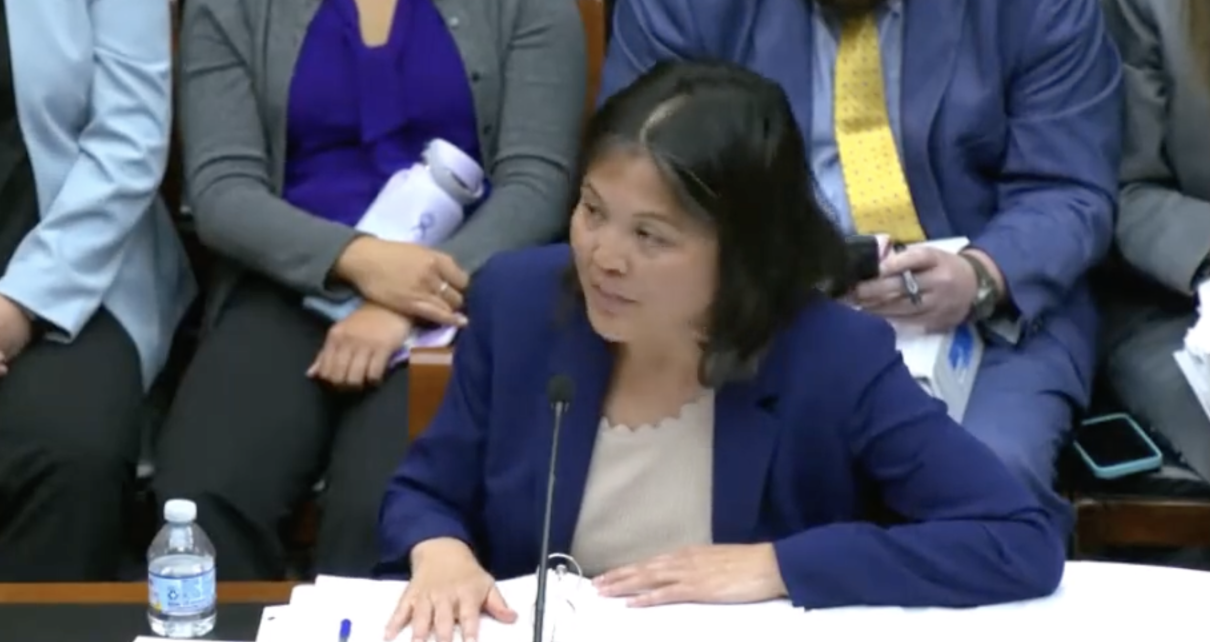
Acting Labor Secretary Julie Su. (Photo: House Committee on Education & the Workforce)
Opposition to Su Federal Freelance Rule Grows: Kiley, Cassidy Introduce Bill to Stop
Washington should support workers, not regulate them into oblivion
By Thomas Buckley, March 6, 2024 3:30 pm
In January, the Department of Labor, headed by Acting Secretary of Labor Julie Su of California pandemic fraud/AB 5 infamy, proposed a federal rule that would gut freelance and gig workers right to remain freelancers and gig workers.
The rule, partially modeled on California’s disastrous AB5 law that obliterated tens of thousands of jobs overnight, seeks to reclassify many freelancers as actual employees of the firms they contract with.
Su has claimed this rule is fair and proper because “misclassified employees don’t get paid for all of their hours.”
But the new rule does not take into account the fact that most freelancers specifically choose to be freelancers to be able to set their own schedule and pick and choose for whom and on what they will work.
The new rule is also a bureaucrat’s fantasy as it is byzantine and allows labor department employees significantly leeway in determining if someone should be considered an employee or a contract worker.
The new fed rule will have different “should you really be an employee and not a contractor?” standards than AB 5. While not as “strict,” as it were, the new standards – and how to judge and rate them – are so obtuse that many of the “employee or contractor?” decisions can and will be made by a mid-level Labor Department bureaucrat in local district offices.
In other words, the standards set up an “eye of the beholder” situation and the labor cubiciloids and rafts of judges and lawyers will be the beholders.
Here – in a nutshell from the Labor Department – is the new test:
The rule addresses six factors that guide the analysis of a worker’s relationship with an employer, including any opportunity for profit or loss a worker might have; the financial stake and nature of any resources a worker has invested in the work; the degree of permanence of the work relationship; the degree of control an employer has over the person’s work; whether the work the person does is essential to the employer’s business; and a factor regarding the worker’s skill and initiative.
How to balance these standards, i.e. which to note as more important and impactful when making a classification decision, is left deliberately obscure.
That is one of the reasons the new rule is so troubling, troubling to the point that Rep. Kevin Kiley (R-Rocklin) and Sen. Bill Cassidy (R-LA) today introduced a “congressional review act” (CRA) resolution to overturn the rule (which, through a CRA, Congress can do.)
“Gavin Newsom and Julie Su’s AB 5 severely restricted independent contracting in California, destroying thousands of livelihoods and harming California’s economy. As Acting Secretary of Labor, Su and the Biden Administration have announced a new Department of Labor rule, modeled after on the same job-killing AB 5 that will cost millions of independent professionals across the country their livelihoods while restricting the freedom of many millions more to have flexible work arrangements,” said Kiley. “Our legislation under the Congressional Review Act nullifies this terrible regulation and protects independent contractors. Washington should support workers, not regulate them into oblivion.”
The reason for the rule, it appears to many, is not in fact to protect workers but to make them eligible for unionization. Freelancers are not employees and can’t be unionized, regular employees can, and Su and the Biden administration are, self-proclaimed, the most big union-friendly administration in recent memory.
And if millions of freelancers are forced to make the switch, union coffers will grow and then, in turn, so will the coffers of the Democratic Party.
“The Biden administration’s priority should not be to do whatever makes it easier to forcibly and coercively unionize workers. It should be to increase individual freedom and opportunity,” said Cassidy. “This new Biden rule does the opposite, jeopardizing 27 million workers’ ability to make their own hours and make a living without being pressured into joining a union.”
Timed to coincide with the introduction of the CRA, a new anti-rule private coalition has emerged: Save Independent Work.
The coalition is backed by Freelancers Against AB5, the Commonwealth Foundation, CABIA, and the California Business and Industrial Alliance.
“The American Dream is rooted in the ability to choose your own path and profession,” said CABIA president Tom Manzo. “This new rule seeks to rob freelancers and independent workers of that choice, forcing them to operate as employees. This also places an undue burden on small business owners who may not be able to accommodate the costs of additional full-time staff. Thanks to this rule, everyone stands to suffer.”
Part of the coalition’s effort will involve direct outreach to members of congress to get them to back the CRA. One such organization that has already started that process is Associated Builders and Contractors, a national trade group with more than 22,000 commercial contractors as members.
“The proposal creates an ambiguous and difficult-to-interpret standard under which employers will be forced to guess which factors will be more important in the determination and how to analyze the facts of their contractual relationships under multiple factors. This confusion will lead to more litigation, as employers and workers alike will not understand who qualifies as independent contractors,” ABC VP Kristen Swearingen. “ABC supports the resolution’s purpose of protecting legitimate independent contractors across all sectors, including construction. This resolution would not only prevent the rule from going into effect but would also prohibit a similar rule from being issued in the future.”
Despite the CRA, the rule will still come into effect on March 11.
The labor department did not reply to a request for comment.
- ADA Diana Teran Booked, Los Angeles DA Gascon Faces Another Complaint - April 28, 2024
- Curiouser and Curiouser: Gascon’s Aide Charges Raise Troubling Issues - April 27, 2024
- Reedley ‘Lab’ Prompts Legislation - April 26, 2024




